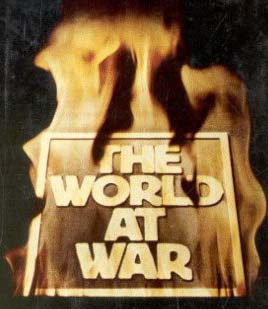In 1973, ITV network in Britain aired the documentary, The World at War, a 26-hour look at events on the battlefield and the impacts of the war on nations as a whole as well as the individuals who fought or were otherwise caught up in it. Narrated by Sir Laurence Olivier, it used archival footage and interviews to tell the story, from the rise of Hitler, Mussolini and Tojo to the aftermath. In addition, it devoted entire episodes to life in occupied countries such as the Netherlands and Holland; life in Britain; and in Nazi Germany itself. And, yes, it devoted an entire episode to the Holocaust. The series took four years to make and is widely regarded as one of the best documentaries of World War II ever made.

A year later, it debuted in the United States, airing in the New York metropolitan area on Channel 9. My father was five years old when World War II broke out, and even though there was much he didn’t remember, the conflict had a tremendous impact on his life. He had a great interest in World War II history that lasted throughout his life, and he was a great fan of war movies, particularly those set during World War II (older movies, mostly, made in the 40s and 50s; more modern movies tended to paint a less “rah, rah America!” vision of the war, and he did not like Vietnam movies much at all–Apocalypse Now? Full Metal Jacket? The Deer Hunter?–Nope, not a fan), and he made it a point to watch The World at War. I don’t remember if I had an actual interest in the war at that point in my life, if I was looking for a common interest to share with my father, or if I just wanted to watch TV, but I watched The World at War with him, and as the episodes unfolded, it wasn’t long before a question came to me: “Why would they film that?”
That refers to the atrocities. It’s interesting to me that the question I asked wasn’t “Why would they do that?” but “why would they film that?” At that age, I probably already knew the answer to the first question, because it can’t really be explained beyond this: there are terrible people in the world who do terrible things. The Nazis were terrible people who committed terrible acts. In my mind, though, the Nazis knew they were doing terrible things. Killing is wrong. Starving people to death is wrong. Mass murder is wrong. Everyone knows this, so why would they film it? Why would you film your soldiers herding French Jews into cattle cars in Paris? Why would you film the “selection” process on the platform at Auschwitz? Why would you film Russian soldiers and Ukrainian villagers falling into a pit after being shot in the back of the head? Why photograph skeletal prisoners crowded three or four to a bunk, or the piles of suitcases, coats and shoes taken from them? Why film the crematoria burning, burning, burning? I understood the record-keeping: the photos of log books kept and the identification cards issued and all that, and I understood filming armored columns and Stuka bombers and Hitler and his generals poring over the maps. That stuff made some sense. But I could not wrap my brain around why you would film your people committing crimes against humanity on a scale not seen before.
In all honesty, I don’t remember how my father answered the question. This was nearly fifty years ago. I was only about eight or nine. What he said doesn’t stick out in my head anymore, and it’s also possible that I simply didn’t understand his answer. Maybe he couldn’t answer it. But fifty years later, as I watch American politicians swear fealty to a man who has mused about suspending the Constitution, who has said he would be a dictator “on day one only” (and really, folks, when was the last time you saw someone willingly walk away from being a dictator? Dictatorships end in two ways: death, or in flight to a friendly nation that promises non-extradition), and who has surrounded himself with racists, misogynists, homophobes and people who pledge to remake the country as a theocracy, I understand.
They thought they were going to win. And if you win, no one is going to hold you accountable.
Happy Independence Day.
Note: There will be more coming on this. I don’t know when. I’m notoriously slow as a writer, and this is a particularly difficult topic for me to organize my thoughts in a coherent fashion.